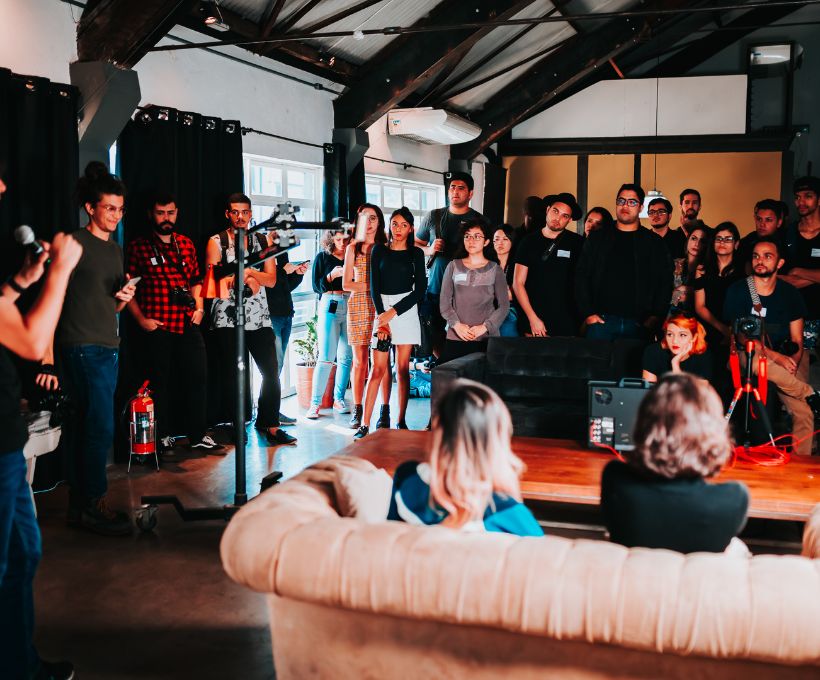In today’s rapidly evolving business and educational landscapes, the demand for skill development and continuous learning is higher than ever. Seminars and workshops have become essential tools for sharing knowledge, fostering collaboration, and enhancing professional development. Whether you’re a business leader, educator, or industry expert, hosting a seminar or workshop can be a powerful way to engage your audience and drive meaningful outcomes.
In this guide, we’ll explore everything you need to know about planning, executing, and evaluating successful seminars and workshops. From defining your goals to post-event follow-up, this comprehensive guide will help you create impactful learning experiences that leave a lasting impression.
Understanding the Importance of Seminars and Workshops
Seminars and workshops are more than just events—they are opportunities to bring people together for focused, interactive learning. Unlike traditional conferences or lectures, seminars and workshops offer participants the chance to engage deeply with the content, ask questions, and collaborate with others in real time.
The benefits of hosting seminars and workshops include:
- Hands-On Learning: Participants can apply new skills and knowledge immediately through exercises, discussions, and activities.
- Networking Opportunities: These events provide a platform for participants to connect with peers, industry leaders, and potential collaborators.
- Expert Insights: Attendees gain access to the expertise of speakers and trainers who are leaders in their fields.
Defining the Purpose and Objectives
The first step in hosting a successful seminar or workshop is to define your purpose and objectives. Understanding what you want to achieve will guide every aspect of your planning process.
Clarifying Your Goals
Start by asking yourself: What do you want participants to walk away with? Whether it’s a deeper understanding of cybersecurity practices, new digital marketing skills, or the latest industry trends, your goals should be clear and measurable.
Example goals might include:
- Skill Enhancement: Helping participants develop specific skills or competencies.
- Knowledge Transfer: Sharing industry insights, best practices, or new research findings.
- Professional Development: Providing opportunities for career growth and networking.
Identifying Your Target Audience
Your target audience will influence the content, format, and promotion of your event. Are you targeting industry professionals, students, or business executives? Understanding your audience’s needs and expectations will help you tailor the seminar or workshop to be as relevant and engaging as possible.
Planning the Seminar or Workshop
With your goals and audience in mind, it’s time to start planning the details of your seminar or workshop. This phase involves selecting a topic, setting a date, and creating a structured agenda.
Choosing a Relevant Topic
The topic of your seminar or workshop should be both timely and relevant to your audience. Consider current trends, challenges, and interests in your industry. For example, if you’re in the cybersecurity field, a workshop on “Cybersecurity Best Practices for 2024” could be highly valuable.
Setting a Date and Venue
Choose a date that works well for your target audience. Avoid major holidays, industry events, or times when your audience may be too busy to attend. Your venue should be accessible, comfortable, and equipped with the necessary technology to support your presentations and activities.
Creating an Agenda
A well-structured agenda is key to keeping your seminar or workshop organized and on track. Consider breaking the event into segments, including:
- Introduction and Icebreakers: Start with a brief overview and an icebreaker activity to set the tone.
- Main Sessions: These could include lectures, presentations, or panel discussions.
- Interactive Activities: Include hands-on exercises, group discussions, or case studies to engage participants.
- Q&A Sessions: Allow time for participants to ask questions and interact with the speakers.
Preparing for the Event
Preparation is crucial to the success of your seminar or workshop. This includes securing speakers, developing course materials, and promoting the event to your target audience.
Securing Speakers and Trainers
Your speakers and trainers are the cornerstone of your event. Choose individuals who are not only experts in their fields but also engaging presenters who can connect with your audience. Consider reaching out to industry leaders, experienced professionals, or academic experts.
Developing Course Materials
Create comprehensive and engaging materials to support your seminar or workshop. This might include slides, handouts, case studies, or multimedia resources. High-quality materials help reinforce learning and provide participants with valuable takeaways.
Promoting the Seminar or Workshop
Effective promotion is essential to attracting participants to your event. Use a multi-channel approach that includes:
- Social Media: Create event pages on platforms like LinkedIn, Facebook, and Twitter to reach your audience.
- Email Campaigns: Send targeted emails to your mailing list with details about the event and registration information.
- Partnerships: Collaborate with industry organizations, educational institutions, or professional networks to spread the word.
Conducting the Seminar or Workshop
On the day of the event, your focus should be on delivering a seamless and engaging experience for your participants. This involves managing the flow of the event, keeping the audience engaged, and using technology to enhance the learning experience.
Engaging Your Audience
Audience engagement is critical to the success of your seminar or workshop. Use interactive activities, encourage participation, and maintain a dynamic speaking style. Techniques like live polling, Q&A sessions, and group exercises can help keep the audience involved.
Managing the Event Flow
Stick to your agenda while remaining flexible to address audience needs or unforeseen issues. Time management is key—ensure that each session is well-paced and that there is ample time for breaks and networking.
Using Technology to Enhance the Experience
Incorporate technology to make your event more interactive and accessible. This could include:
- Live Polling Tools: Engage participants in real-time with polls or quizzes.
- Virtual Whiteboards: Use online whiteboards for collaborative activities.
- Recording Sessions: Record presentations for participants to access later.
Post-Event Follow-Up
The end of the seminar or workshop is not the end of the learning experience. Post-event follow-up is crucial for reinforcing what was learned and maintaining connections with participants.
Gathering Feedback
Collecting feedback from participants helps you evaluate the success of the event and identify areas for improvement. Use surveys, interviews, or social media to gather insights on what worked well and what could be improved.
Sharing Resources and Continuing Education
Provide participants with post-event resources such as recordings, slides, or further reading materials. Encourage them to continue learning by offering follow-up webinars, additional workshops, or access to online discussion forums.
Networking and Building Relationships
Networking doesn’t end when the event does. Foster ongoing relationships with participants, speakers, and industry partners by connecting on LinkedIn, sending regular newsletters, or inviting them to future events.
Measuring the Success of Your Seminar or Workshop
To ensure continuous improvement, it’s essential to measure the success of your seminar or workshop. This involves evaluating attendance, participation, knowledge transfer, and return on investment (ROI).
Evaluating Attendance and Participation
Track the number of attendees, participation in activities, and engagement on social media. High attendance and active participation are indicators of a successful event.
Assessing Knowledge Transfer and Impact
Determine whether the seminar or workshop met its learning objectives. This can be done through post-event assessments, follow-up quizzes, or participant testimonials.
Analyzing ROI and Cost-Effectiveness
Calculate the ROI of the event by considering factors such as participant satisfaction, new business leads, and increased brand awareness. Look for ways to optimize cost-effectiveness for future events, such as through sponsorships or partnerships.
Best Practices for Hosting Successful Seminars and Workshops
To wrap up, here are some best practices to keep in mind when hosting seminars and workshops:
- Foster a Positive Learning Environment: Create an inclusive atmosphere that encourages active participation and collaboration.
- Stay Updated on Industry Trends: Ensure your content remains relevant by staying informed about the latest developments in your field.
- Continuously Improve Your Events: Learn from each event and make adjustments to your planning, execution, and follow-up processes.
Conclusion
Hosting a successful seminar or workshop requires careful planning, preparation, and execution. By defining clear objectives, engaging your audience, and following up effectively, you can create impactful learning experiences that drive meaningful outcomes for your participants.
Whether you’re sharing expertise in cybersecurity, digital marketing, or any other field, seminars and workshops are powerful tools for professional development and knowledge sharing. Start planning your next event today, and watch as it transforms both your participants and your organization.
FAQs about Hosting Seminars and Workshops
- What is the difference between a seminar and a workshop?
A seminar is typically a presentation or lecture on a specific topic, while a workshop is more interactive, involving hands-on activities and group work. - How long should a seminar or workshop last?
The duration depends on the content and objectives. Seminars typically last 1-2 hours, while workshops can range from a half-day to several days. - What are the benefits of attending a seminar or workshop?
Participants gain valuable knowledge, develop new skills, and have the opportunity to network with peers and industry experts. - How do I choose a topic for my seminar or workshop?
Choose a topic that is relevant, timely, and aligns with the interests and needs of your target audience. - What is the ideal audience size for a seminar or workshop?
Seminars can accommodate larger audiences, typically 50-100 people, while workshops are more effective with smaller groups of 10-30 participants to encourage interaction. - How do I promote my seminar or workshop?
Use a combination of social media, email marketing, partnerships with relevant organizations, and word-of-mouth to promote your event. - What materials should I provide to participants?
Provide slides, handouts, case studies, or any relevant resources that will enhance the learning experience and serve as takeaways. - How do I engage participants during a seminar or workshop?
Incorporate interactive elements like Q&A sessions, group discussions, hands-on activities, and live polling to keep participants engaged. - What technology do I need to host a seminar or workshop?
Common technology needs include a projector, sound system, microphones, laptops, Wi-Fi, and any specific software tools for interactive activities. - How should I structure the agenda for my seminar or workshop?
Begin with an introduction, followed by main sessions, interactive activities, and conclude with a Q&A or feedback session. - Can I record my seminar or workshop?
Yes, recording the event can provide a valuable resource for participants to revisit and for those who couldn’t attend. - How can I ensure a successful follow-up after the seminar or workshop?
Send out a follow-up email with resources, recordings, and a feedback survey. Stay connected through social media and newsletters. - What are some common mistakes to avoid when hosting a seminar or workshop?
Avoid overloading the agenda, neglecting audience engagement, poor time management, and insufficient promotion. - How can I measure the success of my seminar or workshop?
Measure success through participant feedback, attendance numbers, engagement levels, and post-event knowledge assessments. - What should I do if the seminar or workshop runs over time?
Plan your agenda carefully and practice time management. If time overruns, prioritize the most important content and consider a follow-up session if needed. - How much should I charge for attending a seminar or workshop?
Pricing depends on factors like the target audience, the value of the content, speaker fees, and venue costs. Research similar events to set competitive pricing. - What are the best ways to encourage networking at a seminar or workshop?
Incorporate dedicated networking breaks, interactive group activities, and post-event social gatherings to encourage networking. - How do I choose the right speakers for my seminar or workshop?
Select speakers who are knowledgeable, engaging, and aligned with the event’s goals. Consider their experience, reputation, and ability to connect with the audience. - What should I do if participants are not engaging during the event?
Address the issue by introducing more interactive elements, encouraging questions, or breaking up the session with short activities. - How can I make my seminar or workshop stand out?
Offer unique, high-value content, engage participants with interactive and practical activities, and create a memorable experience with quality materials and follow-up resources.





